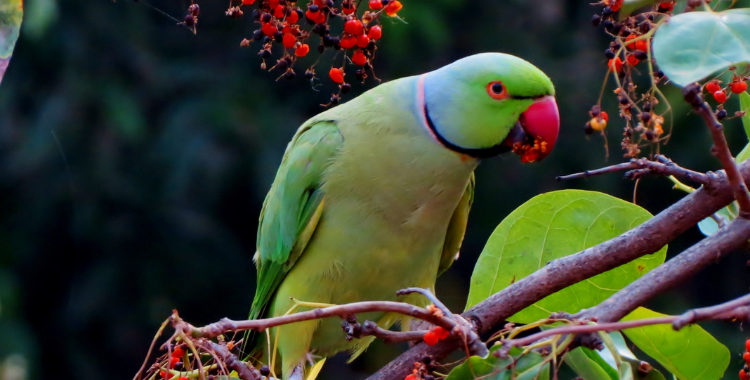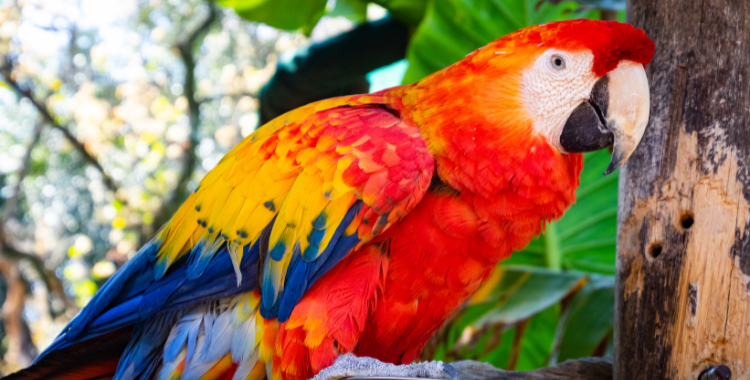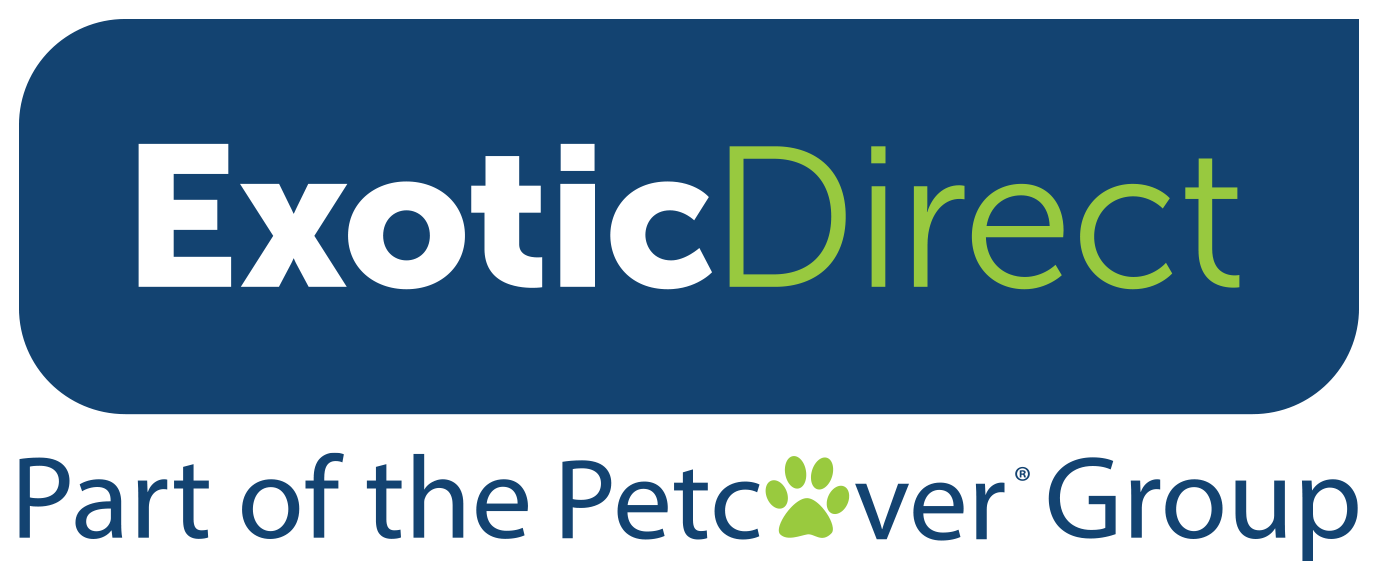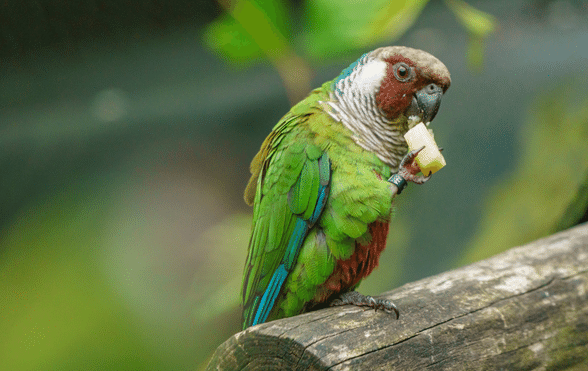Wondering what food do parrots eat? Parrots require variety. From fruits, plants, vegetables and seed, our our guide covers everything required in a parrots diet.
Is your parrot insured? Get a quote for up to £5,000 of vet fee cover, death and theft cover | We’ve been insuring exotic pets since 1996 | Check out our customer reviews on Feefo.
Parrots are one of the most popular types of birds, favoured as pets, with commonly owned species including African Greys, Macaws, Amazons, Cockatoos and Alexandrines.
In this article, parrot expert, Dorothy Schwarz, shares her opinion on parrot’s diets and shares what has worked for her and her parrots during her many years of experience owning these brilliant birds.
If you’re ever unsure, or want further advice, we advise consulting with your vet.
What to feed your parrots and how much to feed
Parrots requires a varied diet. The best foods for your pet parrot to eat are fresh vegetables, fruit and either pellets or seed mixes.
I try to ensure that at least around 40% of my birds diet is fresh fruit and vegetables.
Fruits and vegetables provide an extensive array of vitamins and minerals. Additionally, they are low in fats. Always wash all the produce you feed your bird thoroughly before feeding.
Furthermore, I aim to buy organic fruit and vegetables for my parrots as they contain less pesticides.
There’s debate about whether vegetables are better than fruit for parrots due to the sugar content of fruit.
If you’re unsure about portion sizes and what percentages of various food groups should be fed, consult with your vet as recommended portions vary dependant on the species.
In the wild, parrot’s diet can vary considerably and they like to eat fruit and fruit seeds, nuts, flowers, and corn where they can find it.
 Parrots require a varied diet.
Parrots require a varied diet.
Table of contents: What do parrots eat? | What fruit and vegetables does a parrot eat? | Wild and foraged foods for your parrot | Parrots and nuts | Commercial seed mixes for parrots | Pellets and your parrot | Supplements and your parrot | Sprouts and beans for your parrot | What do parrots drink? | Home prepared and frozen diets | Exercise and your parrot | Your diet has worked
Fruit parrots can eat
- Apples
- Bananas
- Citrus fruits
- Grapes
- Mango
- Papaya
- Passion fruit
- Pomegranate
- Peaches
Want to learn what other fruit your parrot can eat? View our guide on Safe Food and Plants for Parrots
Vegetables parrots can eat
- Asparagus
- Beets
- Bell peppers
- Broccoli
- Butternut
- Carrots
- Collard greens
- Corn-on-the-cob
- Courgettes
- Hot peppers
- Mustard greens
- Spinach
- Leeks
- Winter squashes
- Dandelion greens
- Kale
- Okra
- Sweet potatoes
- Parsley
- Pumpkins
Wondering what else parrots can eat? View our guide on Safe Food and Plants for Parrots.
When getting a new parrot, you may have a little trial and error to understand what fruit and vegetables they prefer.
Any fruit and vegetable from the above list can be tried. Just avoid a lot of mashes or stewed fruit because of fat and sugar content.
What can’t parrots eat?
- Avocado
- Eggplant
- Fruit seeds and pits
- Garlic
- Mushrooms (Mushrooms are a food debated by many parrot experts. Most wild mushrooms are poisonous for humans and birds alike. Even edible mushrooms can contain toxic compounds such as agaritine, hydrazine, and formaldehyde, which can be deadly for parrots. Some argue that button, cremini, portobello, and porcini mushrooms are a safe food for parrots. But, these types of mushrooms must be washed and boiled to remove any harmful toxins before feeding.)
- Onion
- Raw beans
- Raw rhubarb
- Tomatoes. (Tomatoes are a food debated by many parrot experts. Some argue they’re a safe food for parrots, whereas others suggest they’re not. If you do choose to feed tomatoes, only do so in very small quantities.)
- Whole celery sticks
There are a number of fruits and vegetables you should avoid feeding your parrot. If ever in doubt, always consult with your vet before feeding.
Parrots and protein
Giving parrots a small amount of animal protein is generally accepted. Some vets will forbid eggs; others won’t.
We’d recommend consulting with your vet for their advice if you’re considering feeding your bird eggs.
I’ve fed chicken bones for calcium to my Grey’s for almost 20 years. And in persuading my Blue and Gold young Macaw to come to my hand, a chicken bone provided the best lure.
Pellets or seeds?
Alongside fruit and vegetables, your parrots also requires either pellets or seeds. Which to feed is debated amongst parrot experts and vets.
Two of my parrots, Casper Grey and Artha Grey were hand reared by their breeder, then weaned onto seed mixture with fruits and vegetables
My vet recommended pellets. His opinion was that non-professional caregivers couldn’t easily make up a good diet with every vitamin and mineral added.
I buy Tidymix. It is costly but so obviously clean. Then I add chopped fruits and vegetables. I sprout legumes and seeds on a three-day rota and everyone gets a portion each day.
I could never switch Casper Grey or Artha Grey to pellets but with the above diet, they’re healthy.
Commercial seed mixes for parrots
Seed mixes aren’t a complete diet for parrots, even though they look and smell more appetising than brown nuggets. Bear in mind that the cheaper mixes are dusty and too bulked up with sunflower seeds.
Sunflower seeds have a high fat content. They are NOT disastrous for parrots unless they are fed exclusively.
I’ve had the sad experience of two rescue birds dying at 17 and 25, both African Greys. The autopsies showed arteries clogged by an exclusive diet of sunflower.
Part of the issue with sunflower seeds is that their fat content is high which is why they should be fed in moderation – around a dozen a day. This will vary depending on size and species so always consult with a vet if you’re unsure.
Some seed mixes now contain a proportion of pellets. Some manufacturers even create seed mixes for specific breeds so it’s worth shopping around.
Smaller birds like canaries, finches and budgerigars will naturally consume small seeds or pellets whichever you choose.
Pellets and your parrot
Pellets have been around for 30 years and the present ones are greatly improved on the earlier ones.
Most manufacturers now produce pellets for different species. Many pellet diets have been developed by avian experts. It seems a sensible choice for those of us who are busy out at work.
A word of caution here – you get what you pay for. Cheaper brands contain too many fillers, colourings and chemicals that aren’t the best.
I’ve tried different brands but never managed to get my fussy birds to accept them willingly. You may need to do some trial and error to find a pellet your bird enjoys. Like humans, all birds have their own unique set of taste buds.
Baby birds who are weaned onto pellets appear to accept them more easily.
Changing your parrot from seeds to pellets
If you and your vet decide pellets are the way forward, birds can be taught to transition from seeds to pellets over a few weeks.
Lafaber which are most costly seem to be the most liked natural foods.
Is your parrot insured? Get a quote for up to £5,000 of vet fee cover, death and theft cover with ExoticDirect | We’ve been insuring exotic pets since 1996 | Check out our customer reviews on Feefo.
Alternatively you can call our team on 0345 982 5505
Wild and foraged foods for your parrot
These are becoming more popular as people learn what wild birds consume. Green fresh garden produce and certain weeds are closer to a wild diet.
If you’re looking at adding new foods such as the below to your parrots diet, make the transition slowly, gradually adding new foods to their diet.
Making a sudden change could upset your bird’s tummy. If you’re ever in doubt, or want further advice, consult with your vet.
Wild foods your parrot can eat
- Chickweed
- Dandelions
- Sow thistle
- Backberries
- Sloes
- Hawthorn berries
- Plantain
- Fat hen plant
- Cotoneaster berries
Some favourites I like to feed my parrot include dandelions. Every part of that coloured weed is beneficial to parrots.
Loro Parc in Tenerife certainly agrees! It’s home to the word’s largest parrot collection. They’re that committed to feeding their parrots dandelions that they devote full plant beds to house dandelions for parrots.
Another favourite I like to feed my parrots are fresh flowers. In the past, I’ve created wreaths from flowers. Perdy, my cockatoo has previously enjoyed a wreath of orange blossom which was so pretty to watch her enjoy.
When feeding plants and flowers to your bird, you need to ensure you thoroughly wash them. You may be able to pick from your own garden however, if you’re unsure of the source, I’d recommend a quick wash in a weak antiseptic solution in case of pollutants.
You need to ensure you’re careful with what you feed to your parrot. We’ve covered some foods you should not feed to your parrot and lists of poisonous flowers and trees are available on the internet. However, if you’re ever in doubt, hold off on feeding a new food to your parrot and consult with your vet first.
 You can feed plants such as dandelions to your parrot.
You can feed plants such as dandelions to your parrot.
Feeding your parrot nuts
Parrots often love nuts, and as such they make a great treat for training.
You may decline to feed monkey nuts because of the risk of Aspergillosis. (A lung disease with a poor prognosis that is caught from mould). I buy human grade peanuts and and ensure correct storage guidelines and best before dates are being followed.
My aviary houses a small collection of parakeets and rescue parrots who live out in an East Anglian winter. I increase sunflower and monkey nuts in cold weather and have never lost a bird in zero temperatures.
Like legumes, nuts are loaded with protein, but they are also high in fat. Feed your bird all kinds of unsalted nuts, but don’t feed more than a few a day depending on activity.
Recommendations would be one or two nuts a day for most species. More of course for Macaws who have a higher fat requirement.
What nuts can parrots eat?
Parrots can eat: Almonds; cashews; macadamias; pecans; walnuts; brazil nuts; hazelnuts; shelled peanuts; pistachios.
You can also feed your bird peanut butter, as long as you use an unsalted variety.
There are a large variety of peanut butters available now with 100% peanuts as their ingredients so we’d recommend these over anything which contains additional ingredients such as palm oil or any stabilisers. My Artha Grey enjoys peanut butter on toast as a breakfast treat.
What parrots can’t eat
We’ve listed what fruits and vegetables your parrot can’t eat but in terms of other foods they can’t eat, you must avoid salty, fatty, sugary, fried human foods, tea, coffee and alcohol.
That said I know of many pet parrots (mine included) who adore the occasional slice of prawn cracker or piece of toast or other ‘forbidden’ foods.
Moderation is the key word. Since the birds sometimes join us for dinner, we never serve unsuitable food.
Parrots and poisonous plants
Very few plants are poisonous. Two that come to mind are laburnum and yew. I’m not sure if healthy birds with a good environment will even touch poisonous food.
Is your parrot insured? Get a quote for up to £5,000 of vet fee cover, death and theft cover with ExoticDirect | We’ve been insuring exotic pets since 1996 | Check out our customer reviews on Feefo.
Alternatively you can call our team on 0345 982 5505
Supplements and your parrot
Supplements of vitamins, probiotics, calcium and other minerals are a consideration. However if feeding a good proportion of pellets you shouldn’t need them.
With non-pelleted diets, opinions are divided. Many breeders add calcium especially for laying hens. My vet believes a healthy diet containing plenty of green stuff obviates the need for supplements.
We’d recommend consulting with your vet as they’ll be able to advise based on what your parrot eats.
Sprouts and beans for your parrot
Germinating and sprouting seeds and selected beans like chick peas and mung beans release valuable nutrients.
Sprouting seeds can be fed on their own or as a part of diets like Shauna’s mash or the circus diet. Sprouting turns a dry seed into a high quality growing vegetable containing fat as energy source. All seeds benefit from sprouting.
The quality of the seeds you use can be determined by the percentage that sprouts. Expect at least 90% to sprout within 3–5 days. Once you get into the habit of sprouting, it’s not that much of a chore. There are commercial sprout mixes. Tidymix do a good one as do Haiths.
Two top breeders in Suffolk, Michael Hurley and Barrett Watson use sprouts – beans and legumes as a major diet component and their breeding results are superb.
What do parrots drink?
Wild birds drink water from a variety of sources.
In captivity we need to change water at least once, sometimes twice a day. Some carers use spring water; others swear by addition of a few drips of cider vinegar. That’s my choice also.
Home prepared and frozen diets
The Circus Diet and your parrot
In an interesting development, Steve Hartman’s Circus Diet is well worth looking at and perhaps trying.
As a breeder in USA of over 4,000 birds in 20 years, Hartman has shared his expertise on his website The Parrot University.
Steve believes in pea-sized pieces making it impossible for a bird to avoid any food so their brain is quickly programmed to eat every item. Steve writes: “Once a birds’ subconscious and conscious brain is programmed to eat a large variety of foods, it’s much easier to change their diet.”
Portion sizes for your parrot
Steve Hartman recommends the following daily portion sizes:
| Parrots | Circus Diet | Treats |
| Small | 18 grams | 4 grams |
| Medium | 32 grams | 7 grams |
| Large | 90 grams | 20 grams |
Portion size is crucial for captive birds. Never offer more than 10% more food than the bird will eat. Remove the uneaten portion the next morning before offering more food.
Portion size will vary for each species, each individual, seasonal moulting, and breeding cycles. If there’s a lot of food left in the bowl, you’re probably offering too much. if you’re ever unsure about portion sizes, always consult with a vet
Shauna’s mash and your parrot
Shauna’s mash is another development that is gaining in popularity in USA and becoming known about in UK.
Shauna developed a version of her mash from the work of earlier people. Mash is fiddly to make but once made, you can freeze one month’s portions and add your fresh food daily.
Again, we’d advise sufficient research if you’re considering this diet for your parrot. Additionally, it’s always worth consulting with your vet for advice, especially if you’re unsure.
Exercise and your parrot
Wild birds need a high energy diet because they fly long distances. Pet birds don’t.
An American vet claims that 80% of his cases are poor nutrition. Obese parrots like obese people have been eating too many calories.
Captive birds who get little exercise might need the same volume of food as free flying birds but with the fat content restricted.
As with all animals, the more physical activity the more fuel is needed. Also temperature is a factor. I live in East Anglia and the parakeets are outdoors 24/7. I increase the fat content of their diet when the barometer drops. I top up with added sunflowers and monkey nuts in shell and weekly cooked chicken bones. I have never lost a bird to cold.
Signs your parrot has the right diet
Simple daily observation: a bird who has eaten well has bright eyes, shiny feathers and an active posture.
A scale is a useful investment for weekly weighing. My Greys have kept the same weight for over ten years give or take a few grams. You can tell a bird is overweight by seeing if there is fat on either side of the breastbone.
Is your parrot insured? Get a quote for up to £5,000 of vet fee cover, death and theft cover with ExoticDirect | We’ve been insuring exotic pets since 1996 | Check out our customer reviews on Feefo.
Alternatively you can call our team on 0345 982 5505

